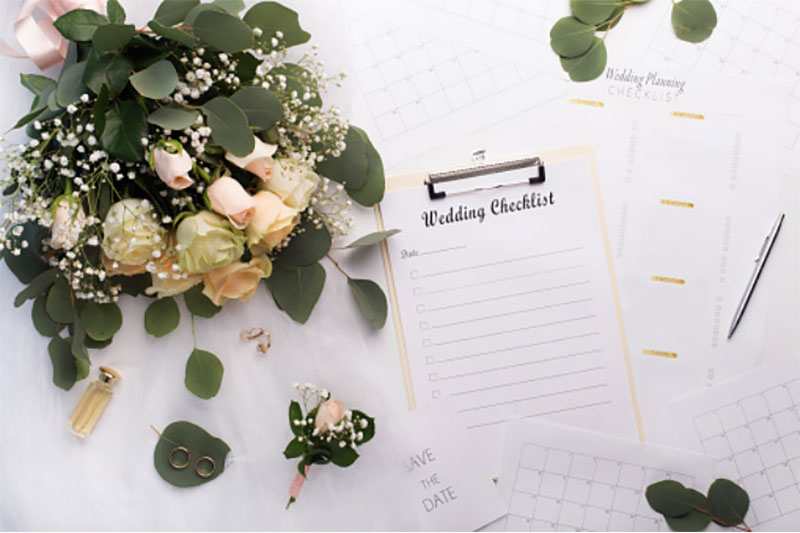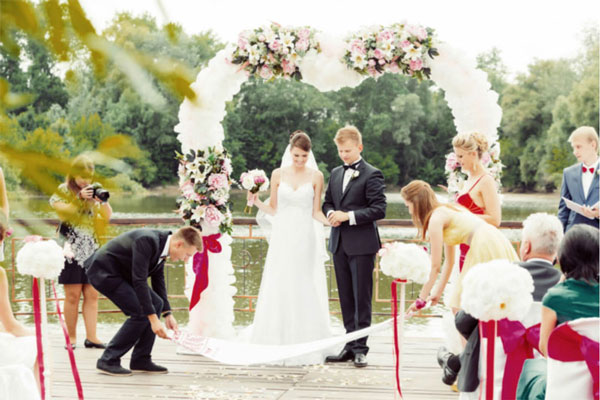Learn how to plan and save for your dream wedding without exceeding the budget. Get the best tips on planning, budgeting, and cutting costs while having an unforgettable celebration.
May 26, 2025 By John Davis
If you’re recently engaged and looking to start planning your wedding, then saving money is likely at the top of your list. With so many details to consider and expenses planned for a wedding, cost management can seem daunting unless you have some helpful guidance.
Fortunately, there are plenty of tried-and-true ways to save on costs when putting together the perfect wedding day. From researching affordable venues and vendors to developing a sensible budget plan, we will break down everything you need to know to save and successfully plan for your special occasion.
Set Your Wedding Budget

The first step in budgeting for your wedding is to set a realistic spending limit. Consider any funds you have saved, such as inheritance or gifts from family members. Also, factor in any potential outside help and loans you may need to finance the remainder of the costs associated with your event. It’s important to remember that this financial plan should be based on what you can afford and reflect what makes sense for your situation. Once all these factors are considered, decide on an amount dedicated solely to wedding expenses.
Research Venues and Vendors

Once you have established a budget plan, it is time to begin researching venues and vendors in the area. Take advantage of local resources to help you source affordable wedding locations, such as your town’s chamber of commerce or a friend who has recently been married nearby.
It can be beneficial to take some time to research local vendors online, look at reviews, browse pictures/videos of their past work, and compare prices between similar services. Doing this will allow you to evaluate each vendor accurately and ensure that you select the best option for your needs and budget.
Create A Plan For Prioritizing Expenses
Once all of the necessary information about different venues and vendors has been gathered, creating a plan for prioritizing expenses is important. Start with the essentials, such as food and attire, and then work down to other items that may need to be more important. This will help ensure you don’t overspend on smaller details while neglecting the bigger picture of your wedding day.
Be Open To Negotiating And Compromising
When dealing with vendors for venue costs, catering services, and entertainment, being open to negotiating and compromising can go a long way when trying to save money. Don’t be afraid to haggle or ask for discounts; many vendors are willing to work with couples who are on a budget.
Consider cutting back in certain areas — opting for less expensive centerpieces or décor, for example — to free up some money that can be used elsewhere. Furthermore, comparing vendors' prices before committing to one particular service is always a good idea.
Don’t discard the idea of DIY projects if you want to cut costs. Crafting your décor or favors is an excellent way to reduce overall wedding expenses while adding a personal touch to your special day! With these tips on saving money and planning for a wedding, your big day will surely be memorable without breaking the bank.
Create A Wedding Timeline
Establish a timeline of when each task should be completed and what progress is expected by certain dates. This will help to ensure that everything is kept on track and that everything is remembered. Utilize wedding planning tools like apps or websites to stay organized and keep all tasks in one place.
When budgeting for your special day, having a plan in place can make all the difference! By setting a realistic spending limit, researching venues and vendors, creating a plan for prioritizing expenses, and being open to negotiating and compromising, you can save money while having an amazing wedding celebration.
Make A Guest List
Keeping the guest list manageable will help keep costs in check, as many venues and catering prices are based on the number of people invited. Plus, hosting a smaller event can be easier and more intimate.
Create A Menu
Decide what type of cuisine you would like to serve and how much food you should be allotted per person. Choose dishes that fit your budget but still allow for variety; consider less expensive protein options, such as chicken or fish, instead of beef or lamb. Also, consider any dietary restrictions among your guests so that everyone can enjoy the meal without compromising their health needs.
Prioritize Expenses
Once you have a budget in place, make sure to prioritize expenses and stick to the allocated amounts for each category. Decide what is most important to you and allocate the majority of your budget towards those items first. This will help ensure you don’t overspend on smaller details while neglecting the bigger picture of your wedding day.
Benefits of Plan For A Wedding
There are several benefits to spending time and effort planning for a wedding.
- It will help you stay within your budget and prevent any surprises that could add additional costs.
- You can create a timeline to ensure that all tasks are completed promptly, reducing stress and organizing the planning process.
- Creating a guest list helps ensure that all of your important family members and friends are invited and keeps costs for catering and other services down.
- Having a plan makes negotiating with vendors and looking for discounts on items such as décor or favors easier.
- Utilizing DIY projects is an excellent way to save money while adding unique touches to the wedding day festivities!
- Planning for a wedding also allows you to create unforgettable memories with your loved ones and involve them in the process of organizing the special day.
By planning properly for a wedding, couples can save money, reduce stress, and still have an amazing celebration without breaking their budget.
FAQS
How do you plan a wedding with little or no money?
Planning a wedding with little or no money is possible with creativity and resourcefulness. Start by creating a budget and setting realistic spending limits for each item. Shop around for discounted items, look for DIY projects that can be used to decorate, utilize online resources such as Pinterest to find ideas, and consider using friends.
Why are weddings so expensive?
Weddings can be expensive due to venue fees, catering services, décor, and other costs associated with the event. Many couples also opt for higher-end wedding items such as dresses and cakes with a heftier price tag. Weddings typically involve larger guest lists which adds to the overall expense of the wedding.
What does the bride's family pay for?
The bride's family typically pays for the ceremony venue, officiant fees, wedding planner and consultant, invitations and announcements, programs, décor and florals, music and entertainment (including a DJ or band), cake cutting fee if applicable, transportation costs such as limos or shuttles for guests. The bride's family may also pay for certain aspects of the reception, such as catering, cake and desserts, wedding favors, photography/videography services, and any additional services or items requested by the bride and groom.
Conclusion
Planning a wedding can be a daunting task, but with the right resources and some creativity, you can have your dream day without breaking the bank. Awareness of the costs associated with weddings is essential to ensuring you don’t go overboard with planning and expenses. Start by setting a budget, then shop for vendors with discounts.

Using the Producer Price Index (PPI) to Predict Inflation
Learn how to predict inflation using the Producer Price Index (PPI). Also, learn the basics of the PPI, how it is calculated, and how it can be used to make informed financial decisions
May 26, 2025 Kelly Walker

Ways to Increase Your Chances of Getting a Job After College
Are you a college student looking for an edge in the job market? Get tips on making yourself stand out from other candidates, maximize your interview potential, and network effectively.
May 26, 2025 Kelly Walker

A Guide to Early Retirement Offers
If you've been given an early retirement offer, here are some things to consider before deciding.
May 26, 2025 Kelly Walker

Top Bachelor's Degree for a Hedge Fund Career
Start your hedge fund career by exploring and understanding which bachelor's degree will give you an edge over others vying for similar positions.
May 26, 2025 Kelly Walker

Difference between GAAP and IFRS
Generally Accepted Accounting Principles (GAAP) and International Financial Reporting rules (IFRS) are two sets of accounting rules that businesses use to develop and display their financial accounts. While IFRS is utilized in many other nations throughout the world, GAAP is a set of accounting standards that are predominantly employed in the United States. The geographical scope is the main distinction between IFRS and GAAP.
May 26, 2025 Kelly Walker

Best and Worst Cities for Investing in Airbnb Properties
Ready to start investing in Airbnb properties? Check out this guide on the best and worst cities for investment so that you can make smart decisions about where to put your money.
May 26, 2025 Rick Novak